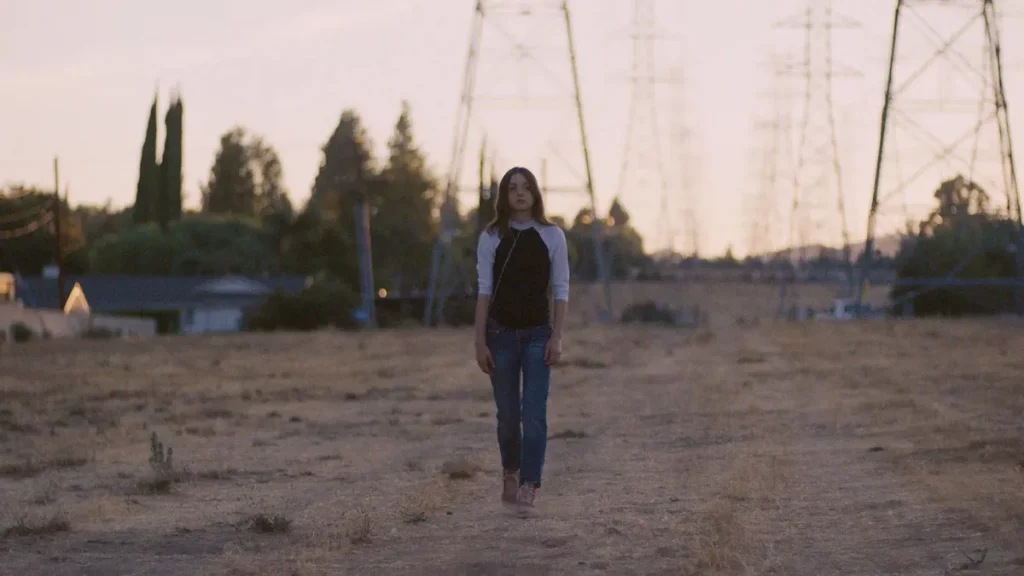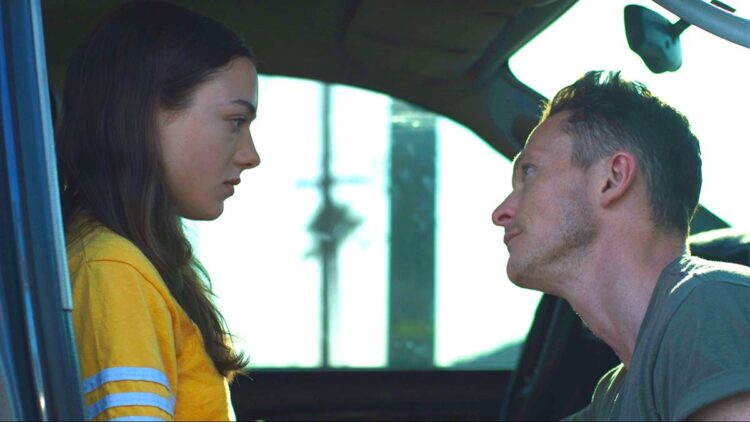In one of the most unsettling movies in memory, first-time filmmaker Jamie Dack’s blunt force Palm Trees and Power Lines, about a slow-burn relationship between a vulnerable seventeen-year-old girl and her manipulative thirty-four-year-old suitor, is a picture difficult to describe in that it obscures a certain agenda for both the audience and its unsuspecting young heroine. When that agenda is revealed the film is abjectly disturbing. While it will not be for everyone, this highly distressing examination of trust, dependency, coercion and, ultimately, exploitation is a knockout indie drama.
Written by Dack (who won the 2022 Sundance dramatic directing prize) and Audrey Findlay and set at the tail end of hot southern California summer, the picture opens with familiar context—a group of bored teens whiling away the final days before school starts. In this milieu we meet Lea (the revelatory Lily McInerny), who at first glance appears one of those disaffected young people the movies so often love to depict, but upon closer inspection is an introspective, fatherless minor living with a single mother (Gretchen Mol) who, when not selling houses, entertains a revolving door of boyfriends.
Despite backseat sex with her teenage beau (Timothy Taratchila) and suntanning with her best girlfriend (Quinn Frankel), Lea’s faraway look suggests a need for something—anything—to transport her from the doldrums. Her world turns upside upon an altercation at the local diner and chance meeting with a chivalrous older man who comes to her rescue. Tom (Jonathan Tucker) seems to be everything the juvenile boys are not—handsome, built, successful, articulate, attentive, responsbile—and after convincing Lea to take a ride home in his truck, the two strike up a friendly, and quickly romantic connection. Despite the age difference, they believe themselves simpatico, sharing conversation, chemistry and clandestine dates at the beach. The more charming and protective Tom seems, and the more validates Lea’s opinions of her mother and friends, the more she begins to emotionally depend upon him. Of course, in her mind she has issued consent, so the relationship is on the up and up. We know better.
Tucker, in an ace performance that must have been incredibly difficult to calibrate, is convincingly charismatic, smartly conveying Tom’s sweet talking romantic surface while effectively masking something far darker beneath. For awhile, he is so superb at conveying a calculated “love” that it takes us a bit to understand the danger, which is that Lea—being groomed via her vulnerability and naivete, qualities Tom insidiously exploits—is rushing headlong toward catastrophe. While the nature of this impending crisis may be unclear, it will be unavoidable.
Even when presented with objective outsider concerns, as when a waitress quietly inquires if she “is okay” and then proceeds to reveal some unpleasant information, Lea is willfully blind to her paramour’s motives. Watching this unfold is akin to experiencing a horror film where we recognize a lurking killer yet are powerless to warn his victims.

All of this leads to an inexorable scene set in a hotel room where the nature of the relationship is finally and explicitly revealed. This agonizing extended sequence, told partially in close-ups relying on McInerney’s vivid expressiveness, also makes superb use of the camera, precise in framing and depth of field to illustrate absolute diminishment.
While the teen at the picture’s center may not, adult filmgoers will recognize the upsetting game underway as Tom pits Lea against her mother and friends while reordering her priorities as to be wholly dependent upon him. What is powerfully provocative in this film—and destined to “trigger” many while enlightening serious filmgoers with nerves of steel—is the depiction of effective grooming techniques which, frighteningly, may appear benevolent until far too late.
Dack adapted Palm Trees and Power Lines from her 2018 short film of the same name which played at Cannes, and was purportedly based on her own experiences. In her feature, she pulls no punches in a demonic view of a calculating predator systematically demolishing his prey, eradicating a young woman’s ability to discern right from wrong and, in the sobering final scene, her sense of self-worth.
Palm Trees and Power Lines is upsetting—and unmissable.
4 stars




